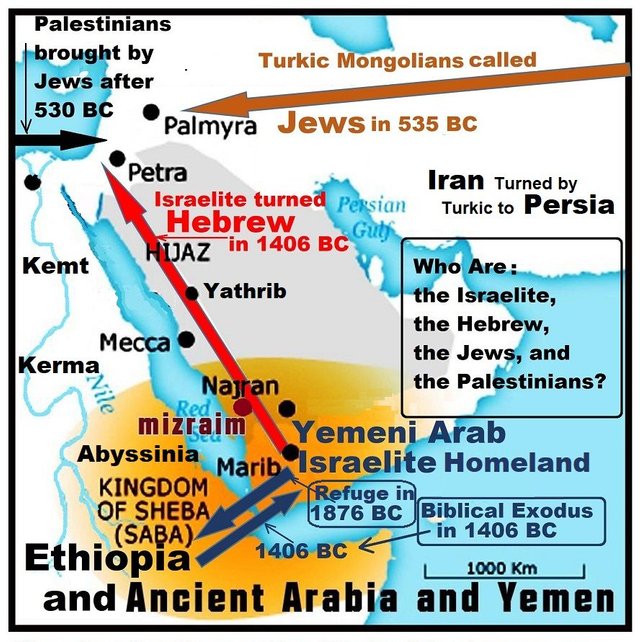Who Really are the Israelite, Hebrew, Jews, and Palestinians?

Surely, understanding the Israeli-Arab co-called "Conflict" or drama cannot be more easier than with diagram.
http://wp.me/p1OEJz-1eX
There is no doubt that Hebrew Israelite is totally a different group from the relatively newer Jews. It is very important to draw clear distinctions between three different groups who are commonly regarded as one group.
First: The ancient Yemeni Arab Israelite “sons of Israel” those who took refuge in Ethiopia for 430 years staring with Patriarch Joseph then into the whole of Africa in 1876 BC. This Semitic group created wide spread Israelite slavery in all parts of Africa. These were Arab Yemeni Tribe.
Second: The ancient Yemeni Arab Israelite “sons of Israel” who renamed themselves to Hebrew. After the Israelite came back to Yemen from Ethiopia, via the Exodus in 1446 BC, they moved on to the north and invaded, colonized, and mixed with the Canaanites since 1406 BC. Later on, they were mostly deported to North Africa by the third group since the invention of Jews and Judaism, which created the Ten Lost Tribes. These are the Hebrews who are part from Israelite
And, the third group is the Turkic Mongolian “Jews” and followers of “Judaism” who were invented by Turkic Persia in 580 BC after a fraudulent Babylonian Return, replacing few hundreds of Hebrew Israelite captive rulers from the House of David by many hundreds of thousands of Turkic settlers. This created “The Jews” who invaded and colonized the Hebrew Israelite, the former invaders and colonizers of Canaan. These Jews deported most Israelite and Canaanite and brought in exchange the Palestinians from Crete and different Mediterranean regions.
According to the Hebrew Bible, the exact place of Moses' grave remains unknown, in order to impede idolatry. Moses died in Yemen; he never went any further, that is why no one will ever find his tomb.
In 1881, the French vice consulate in Yemen wrote to the leaders of the Alliance (the Alliance Israelite Universelle) in France, that he read in a book by the Arab historian Abu-Alfada that the Jews of Yemen settled in the area in 1451 BC. (45 years before the Israelites invaded Canaan only in 1406 BC. Wikipedia. https://en.wikipedia.org/wiki/Yemenite_Jews#Early_history
He called them Jews but this is wrong he should have said (Israelite) because the term Jews appeared after 530 BC only.
There are a few references in Egyptian texts to Shasu nomads living in the area of Nubia south of Egypt. Merneptah Stele mentioned "Shasu", a term used by the Egyptians to refer to nomads and marauders. I guess it refers to Israelite in the Sudan or Libya. If it was referring to those in Canaan it should had been "Habiru or Apiru".
Two New Kingdom inscriptions which refer to “the Land of the Shasu of Yahweh” are found in topographical lists. One list is at Soleb and the second at Amarah-West. Soleb, a temple dedicated to the god Amon-Re, was built by the Pharaoh Amenhotep III in ca. 1400 BC. Today it is located in the nation of Sudan, on the left bank of the Nile about 135 miles south of Wadi-Halfa.
Amarah-West, which is also located in Sudan, is a construction of Rameses II in the 13th century BC and has massive topographical lists inscribed in it. The section of the Amarah-West topographical list which contains the reference to “the land of the Shasu of Yahweh,” was almost certainly copied from the earlier list at Soleb.
The Soleb stele dates to 1400 BC which was found in Sudan mention “Shasu of Yahweh”.
Watch this video, particularly form 1.00 min.
The remnants of Israelite after the Exodus didn't stop roaming, looting, enslaving, and invading for very long time in North, West, Central, and East Africa. They had brought Kerma civilization to an end during Classical Kerma (ancient Nubia) (c. 1750–1580 BCE) and colluded with the Hyksos against Egypt.
This was the same period which witnessed the Slavization of Eastern Europe, the fall of Hittite, and the great collapse of 1177 BC, and the appearance of the Sea People, all these were results of Turkic nomads who later took over Iran and created Persia.
I assume the Egyptians recognized that the Israelite and the Hebrew although were from different directions but of the same Yemeni Arab origin. The Israelite were active in Africa while the Hebrew in Canaan. The Turkic Mongolians were looting Western Asia, Eastern Europe, Caucasus, and Anatolia.
The Israelite in Africa got more strength after the Turkic Persian Jews expelled most of the Hebrews of the Ten Tribes of Israel and the Canaanites after 530 BC. Some of the expelled were brought to North Africa and joined the Israelite slavery bands. They were joined by more Turkic groups after 650 AD.
Most probably together they created the light-complexion Fulani, who are all over Africa north to the Equator, and may be the Israelite are part of the Tutsi of Rwanda, Uganda, Burundi, and Eastern DRC